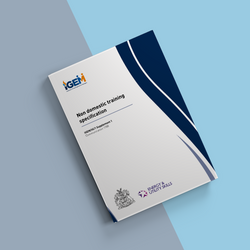IGEM/IG/1 Supplement 1 - Non-domestic training specification

Industry formed a working group facilitated by IGEM to prepare IGEM/IG/1 Supplement 1 Non domestic training specification. Those industry bodies who contributed include: the Large Business Forum, EUA, ICOM, CEDA, CESA, CITB, SLEAT, UKLPG, EU Skills, Gas Safe Register and organisations including: National Grid, Wales and West Utilities, National Grid Metering, Energy Assets, Calor, Carillion, British Gas Business Commercial Services, Romec, UK Certification, Northern Gas Assessment Services, Logic Certification, Blueflame Associates, GTS, CH4 Services, Global Energy Associates, Installation and Design Services, SA Gas Engineering, Cert-ain Certification, Specialist Gas Assessment Services, GATC, CentriC Technical Services.
This Specification is designed to provided the criteria for training to be developed for a new entrant to the industry to gain an initial overall understanding of the non domestic gas industry and then proceed to a sector specialisation course, for example pipework, metering, heating, catering, laundry and process/plant.
Introduction
1.1 ‘Standards of training in gas work’ (IGEM/IG/1) is one of the outcomes from revision in 2013 to the Safety in the installation and use of gas systems and appliances L56 Approved Code of Practice and relates specifically to Regulation 3 (1), see paragraphs 80 and 81.
1.2 IGEM/IG/1 sets out the requirements for training in gas work for; new entrants to the gas industry working under the scope of the Gas Safety (Installation and Use) Regulations (GS(I&U)R); those persons currently or previously registered seeking re-registration as a ‘class of persons’ (or have a relevant gas qualification) and; those persons working at premises or on equipment outside the scope of GS(I&U)R.
1.3 This Non domestic training Specification relates to:
- new entrants into the gas industry wishing to become a ‘class of persons’ will be required to undertake an industry recognised training course before being able to take an assessment under the Nationally Accredited Certification Scheme for Individual Gas Fitting Operatives (ACS) to be become Gas Safe registered.
1.4 Industry has recognised that there has been a shortfall in training and so a two part learning programme has been structured to cater for new applicants wishing to enter the gas industry and work in the non domestic utilisation sector.
1.5 Industry formed a working group facilitated by IGEM to prepare this Specification. Those industry bodies who contributed include the Large Business Forum, EUA, ICOM, CEDA, CESA, CITB, SLEAT, UKLPG, EU Skills, Gas Safe Register and organisations including National Grid, Wales and West Utilities, National Grid Metering, Energy Assets, Calor, Carillion, British Gas Business Commercial Services, Romec, UK Certification, Northern Gas Assessment Services, Logic Certification, Blueflame Associates, GTS, CH4 Services, Global Energy Associates, Installation and Design Services, SA Gas Engineering, Cert-ain Certification, Specialist Gas Assessment Services, GATC, CentriC Technical Services.
1.6 This Specification is designed to provide the criteria for training to be developed for a new entrant to the industry to gain an initial overall understanding of the non domestic gas industry and then proceed to a sector specialisation course, for example pipework, metering, heating, catering, laundry and process/plant.
1.7 Training courses that have been designed to meet this Specification and have acquired industry recognition will enable those that successfully complete that training to apply to an ACS centre for an appropriate assessment(s) of competence. Passing such assessment(s) will enable that person to apply to Gas Safe Register to become a ‘class of persons’ to allow them to work in those premises covered by GS(I&U)R.
1.8 This training may equally be appropriate for those persons working at premises or on equipment outside the scope of GS(I&U)R.
Scope
2.1 This training Specification covers training for new entrants wishing to work in non domestic utilisation sector.
2.2 The requirements of that training will include theoretical and practical subjects and the activities that will have to be undergone in a work placement supervised by a Gas Safe registered engineer, as appropriate.
2.3 The requirements will include the minimum time spent on each subject along with the job activities that are required to be undertaken and the maximum time spent to complete the training is expected to be two years.
